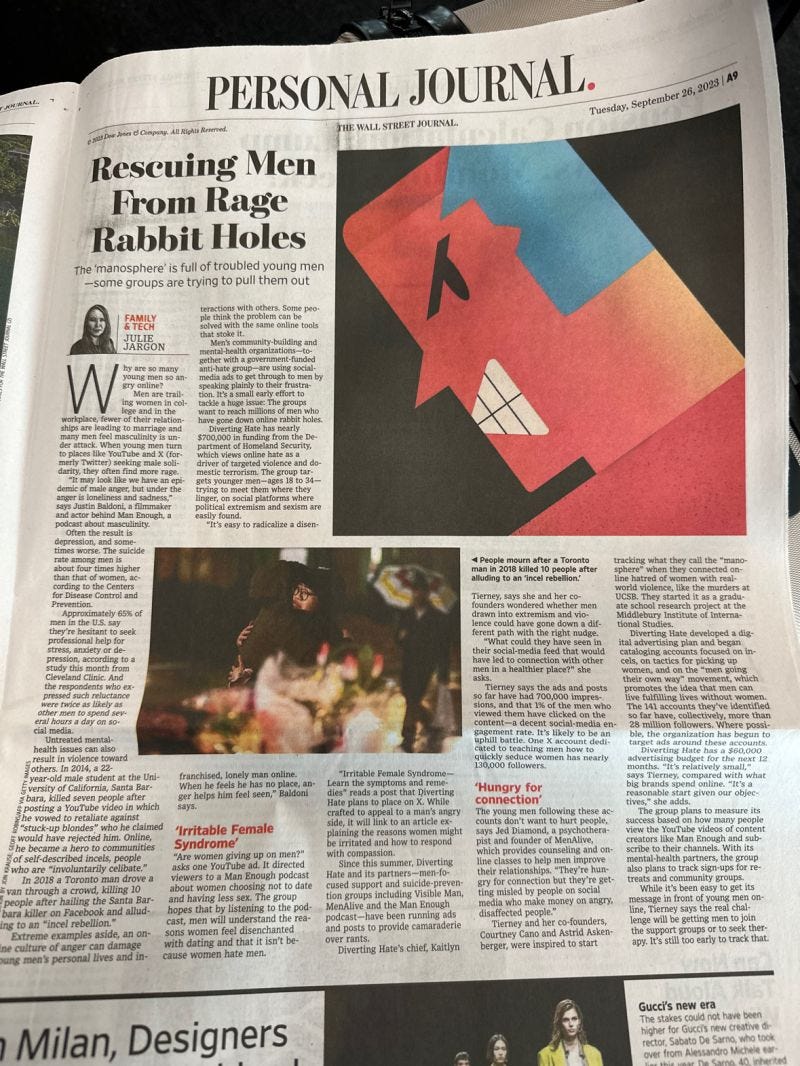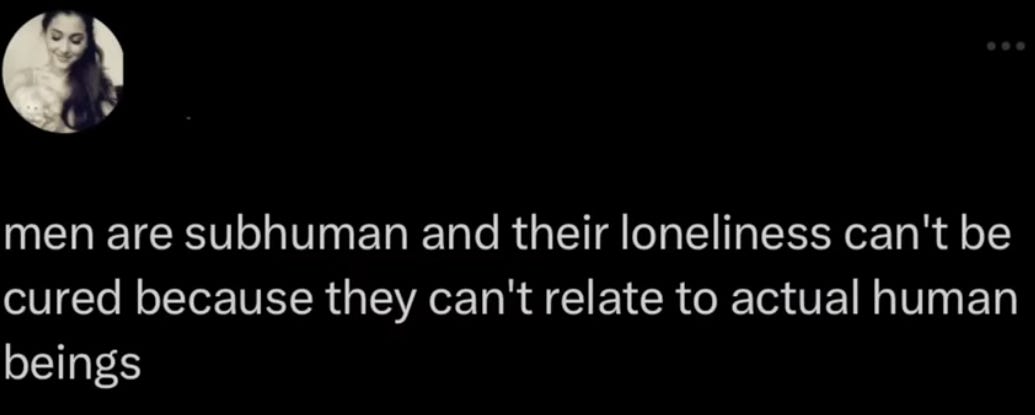Last week, CNN aired a must-watch episode with the somber headline, “AI girlfriends are here and they’re posing a threat to a generation of men.” If that sounds as if the show might possibly express some compassion for young men and for the “epidemic of loneliness” referred to in the show, it was not to be. Even an expert, Scott Galloway, profiled briefly on how society is “failing men,” felt the need to express contempt for their alleged conspiracy theories, online misogyny, and even (gasp!) climate change denial. With friends like these ….
The segment is fascinating, however, for its revelation of some pundits’ uneasy awareness of male discontent.
The first minute of the segment showed clips from a decade-old movie (Her) starring a heartbroken man, played by Joachin Phoenix, who falls in love with an AI female whom he talks to on his phone. In the clips, he says that he is happy to have found someone, at last, to be with.
A (human) female friend of his, though, is angry. “You always wanted to have a wife without the challenges of actually dealing with anything real!” she accuses, on the verge of angry tears: “I’m glad you found someone.”
She isn’t glad, of course, and neither is the expert brought on to educate CNN’s viewers about men going astray. The expert is Liberty Vittert, a statistician and professor of data science at Washington University’s Olin Business School. But she might as well be an AI feminist, so predictable was her analysis of the male entitlement allegedly driving the turn to AI girlfriends. Though a statistician, Vittert gave no data about the numbers of men who are paying to access AI content. While the CNN host, Michael Smerconish, seemed open to the possibility of exploring men’s points of view, the expert could only emphasize male failure.
She condemned young men for “choosing AI girlfriends over real women.” The choice means, according to Vittert, that “they don’t have relationships with real women, don’t marry them and then don’t have and raise babies with them.”
But wait, aren’t marrying and raising babies a patriarchal imposition on women—part of the “comfortable concentration camp” that Betty Friedan so memorably indicted?
Professor Vittert says nothing about the decreasing number of young women willing to marry and procreate. Her (botoxed) mouth turns down in disapproval as she explains that the increasing realism of AI is “enabling this entire generation of young men to continue in this loneliness epidemic.” It seems that men prefer sterile self-pleasuring and facile scopophilia to the “hard work” of relationships with real women. Like Joachin Phoenix’s hapless character, these men, she says, are so fixated on perfection that they “are not able to deal with ups and downs, not only in a relationship, but in life in general.” The glibness of the condemnation is remarkable, though far from unusual.
It’s not clear if Professor Vittert has ever talked to actual men about why some of them (not “an entire generation”) might choose an AI relationship. Does she know any young men who have tried for years without success to find a marriageable girlfriend? Many discover that such prizes are remarkably thin on the ground, many of them unsuitable to be considered as future mothers. Even worse, perhaps, does Vittert know anything about what can happen to an inexperienced young man who pursues the wrong woman or women (there are a couple of heartbreaking examples in Sons of Feminism)? How many times does a young man who has failed repeatedly need to hear that no woman owes him love or sex before he starts thinking that giving up on them might not be a bad idea? Meanwhile, women laugh at his loneliness and drink “I bathe in male tears” mugs.
To give him credit, CNN’s Smerconish asks a few questions about the male point of view: “What’s going on with the women?” Has the power dynamic shifted in their favor? Are they less approachable than formerly? These only scratch the surface, but he’s chosen the wrong expert for such a conversation.
Vittert freely admits that there are now many more women than men at university (thanks, affirmative action!) and that far more women than formerly are choosing career over homemaking (thanks, feminist propaganda!). But those are good things, and young men simply need to adapt. Calling any of this debacle women’s fault, she declares, would not be “the right way to go.”
She and the host then turn to a topic on which they have no trouble placing the blame entirely on men: the unrealistic” expectations” men develop, allegedly due to AI and pornography (again, with no studies or data) about what real women should look and act like. This, they both agree, is very troubling.
Do women have unrealistic expectations about men? Such is never mentioned. It’s a problem only if men expect too much from women, including that women might want to please them or like them. That men should want to please women and like them—even with few reasons to do so—is a taken-for-granted social good that neither commentator feels the need to defend.
Recently the Wall Street Journal published an article on “Rescuing Men from Rage Rabbit Holes,” which counsels that men need to be told that their perceptions of unfairness or bigotry—all such being identified as misogyny—are misunderstandings to be corrected. The article informs readers that hundreds of thousands of taxpayer dollars are being funneled into feminist groups like Man Enough and Diverting Hate to coach lonely, angry men to have more compassion for women (I kid you not). Having alienated men through decades of vilification, feminist groups now reassure us that more propaganda is in the works.
Like the segment on AI girlfriends, “Rescuing Men” begins as if in sympathy with men, highlighting their declining participation in university education and marriage; their high rates of depression and other mental illnesses; and their staggering suicide numbers. The latter, always alarming, are once again on the increase, as provisional data for 2022 indicate an overall increase of 2.3% in suicides by American men. Nearly 40,000 American men (4 X the number of women) killed themselves last year. White men make up a startling 94% of the total number.
As with the AI discussion, however, the focus on male alienation quickly dissipates, as the article pivots away from men’s troubles to a concern far more interesting to feminist ideologues: the relatively small number of men who turn their despair outward, committing acts of “domestic terrorism.” The few well-known examples (Elliot Rodger, Alek Minassian) are mentioned, the implication being that any man seeking an outlet for non-feminist discussion is likely to join their murderous ranks. A psychotherapist is quoted that such men are being “misled by people […] who make money off angry, disaffected people.”
Though the article provides no evidence that online chat rooms and manosphere content lead to an increase in violence against women—and though there is some evidence, as I’ve previously discussed, that they provide a release mechanism for embittered men—the emphasis of the article is on convincing men that their anger is “unhealthy.” Through various feminist support groups and opportunities for “therapy,” such men are to be led to a “healthier” place of pro-feminist awareness.
The groups work by fooling men into thinking they have found manosphere content. “Are women giving up on men?” one YouTube ad asks. It links to a Man Enough Podcast “about women choosing not to date and having less sex” through which men can come to understand women’s reasons for dating less, and can recognize “that it isn’t because women hate men.” “Irritable Female Syndrome—Learn the symptoms and remedies” is a post planned by Diverting Hate “crafted to appeal to a man’s angry side” that will then link to an article “explaining the reasons women might be irritated and how to respond with compassion.” By telling men that what they see in the world is not really there, they will coach them in greater compliance.
The discussion never mentions the reality of female rage. We have abundant evidence that angry women who express hatred against men are not only tolerated and rewarded with elite positions and hefty pay-cheques (“Why Can’t We Hate Men?” in The Washington Post, “Why I Hate Men” in The Guardian) but also applauded and amplified in the mainstream media, movies, academia, and politics (Nikki Haley, “If you want something said, ask a man; if you want something done, ask a woman”). I challenge anyone reading this to find a comparable mainstream expression of male contempt for women.
Perhaps rather than gaslighting men, some of these do-gooders might coach women on how to feel “compassion” for men—or at least to stay quiet about their flagrant disdain. Feminists can deny that (many) women hate men, but when the evidence for that hatred is all around, some number of men will fail to be convinced.
If female rage were simply a noxious phenomenon permeating the air waves and social media, many men would happily ignore it. Unfortunately, such rage has taken material form in laws and policies that actively favor women and disadvantage men in hiring, promotion, education, government programs, funding, and in the massive machinery of divorce, child custody, alimony, child support, and social services. For a man who has had his wages garnisheed after divorce and is no longer able to see his children because of his ex-wife’s false allegations, being coached to have more compassion is not going to do a lot for him. He has a reason to be angry, and pretending that he has merely been bamboozled by online misogynists is unlikely to persuade.
Men have every right to seek out content that confirms their perceptions and helps them understand their situations. If some choose AI girlfriends, the last thing they need is a lecture on their selfishness. If they refuse to believe in climate change and consider so-called conspiracy theories, and even hate despicable women, the responses make sense in a society that is far more interested in controlling men’s minds than helping them improve their lives.
As the two examples above indicate, a significant number of men are reacting to the bad press and discriminatory laws they experience, and mainstream pundits can no longer ignore them. The pundits are right that male alienation is a looming problem for men and for society, and we should support male-positive organizations that provide advocacy and support for men. That starts with taking their anger seriously.









Thanks, Janice, for shining some light on these dishonest feminist spiels. Don't bother understanding men. The aim is to fix them so they meet women's expectations. What more could men aspire to? Rage rabbit holes? Somebody thinks of a cute phrase and it becomes a syndrome. The Wall Street Journal used to be made of better stuff.
Dr. Fiamengo has once again hit the nail on the head. Feminism has been remarkably successful in deploying casuistic strategies to obtain total control of and subsequently weaponize the semiotics of rage and victimhood. As Dr. Fiamengo's expert analysis of these incidents shows, the feminist agenda has reached a point where we are to believe that woman's rage is evidence unto itself of the moral superiority of women and their struggle against injustice while man's rage is to be accepted a priori of his degeneracy and misogyny. This reminds me of a chilling episode I experienced many years ago shortly after marrying my wife. She announced to me that she wanted to have one day a week where she could unleash her rage and I would agree to endure the abuse without retreating, responding, or holding her responsible in any way for her behavior; she had come across this idea in one of the feminist books that she ardently read and found it brilliant. Although we'd been together for nearly three years before getting married, I had no idea that she was so filled with rage. Needless to say, there was no mention of me being afforded a time slot to spew vitriol at her (nor would I have wanted even five minutes a week for such a purpose; the idea seemed abhorrent to me). I must have gone completely pale as the blood drained from my face upon learning that the person I had just chosen as my life partner would like to schedule weekly abuse. After spending years building monuments to her rage and sense of victimhood, I finally escaped that marriage having learned that it's impossible for a man and woman to have an equal partnership in a culture that enables women to wield such immense power over their mates while degrading and infantilizing men.